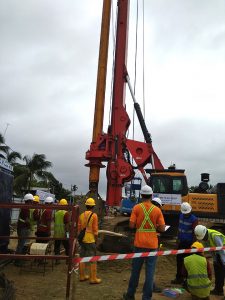Drilling work for installing bored piles on the Dala side of the Yangon-Dala bridge across the Yangon River was started on 28 June. The bridge is expected to be completed by December, 2022, according to the Bridge Department under the Ministry of Construction.
The bridge will connect Bo Min Yaung street in Dala Township with Phone Gyi street in Lanmadaw Township. Currently, drilling work for installing bored piles has begun on Dala side. The department plans to construct 14 piles.
Union Minister for Construction U Han Zaw, the South Korean Ambassador to Myanmar, Hluttaw representatives, and officials from the Bridge Department inspected the project area on the first day of drilling.
“Today is the first day of bridge foundation implementation. We will build the bridge step by step. The construction is being done with the use of Korean technology. We began implementing the project in May, 2019. We expect to complete construction by December, 2022. Once completed, the bridge will contribute to the socio-economic development of local people residing on both sides,” said U Thet Wai Aung, Assistant Director (Civil), Bridge Department.
Myanmar has obtained US$ 137.833 Million, a 40-year loan, from South Korea’s Economic Development Cooperation Fund at an interest of 0.01 per cent. The main contractor of the bridge is GS Engineering Group from Korea.
In the second phase of the project, an approach road will be built from Phone Gyi street by the Shwe Taung construction company. The third phase will involve the construction of two towers in the middle of the river and a cable suspension bridge. The phase will be implemented by CCEC, a Chinese company.
The Yangon-Dala bridge will measure 6,144 feet in length, including the 690-meter main bridge, the 577-meter approach road from Dala side, and the 601-meter approach road from Yangon side. The bridge will be 370 m long and clearance of the of 49 m high. The bridge will have a four-lane road, with each lane measuring 4 m in width.
The bridge will shorten the time taken to travel from Yangon to Ayeyawady region. It will also lower the transportation cost for locals commuting between the regions. The project is expected to benefit residents of Dala, Twantay, Kungyangon, and Kawhmu townships of Yangon region and locals living in Maubin, Kyaiklat, Dedaye, Pyapon, and Bogale townships of Ayeyawady Region.—Myo Min Thein
(Translated by Hay Mar)


